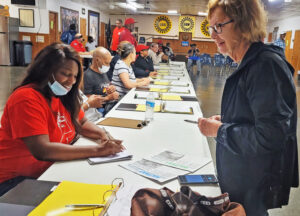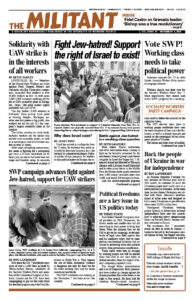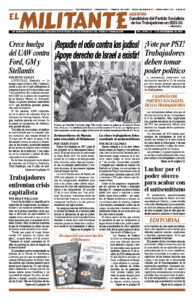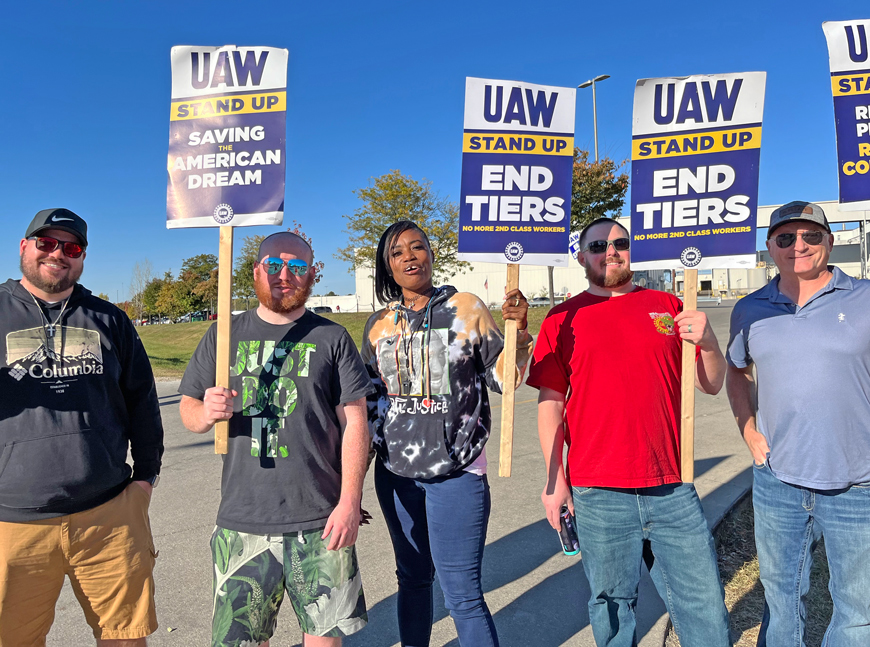LOUISVILLE, Ky. — Members of the United Auto Workers on strike against Ford, General Motors and Stellantis, the Big Three auto companies, expanded their walkout to over 45,000 strikers on Oct. 24, with some 5,000 UAW members walking off the job at GM’s assembly plant in Arlington, Texas. The plant makes highly profitable full-size SUVs.
The day before, 6,800 workers at Stellantis’ Ram pickup truck plant in Sterling Heights, Michigan, another one that makes a big profit, also walked out off the job. It’s the company’s largest assembly plant in the country.
The strike, nearing its sixth week, includes workers on the picket line outside auto-assembly plants, as well as at warehouses and distribution centers in over 20 states.
After years of making concessions, the union is fighting for a substantial pay raise, a 32-hour workweek for 40 hours pay, an end to the hated two-tier wage and benefits setup, to reinstate cost-of-living adjustment to fight the effects of inflation, and for improvements to retiree pensions and health care plans.
Workers on the picket line here at the Ford Kentucky Truck Plant Oct. 23 celebrated the news that their brothers and sisters in UAW Local 1700 at Stellantis’ Michigan plant had joined the strike.
“It’s a workers’ revolt,” UAW Local 1700 member Randy Harvard told CNBC News. “It’s not just us now. Everybody’s on strike now — from the actors all the way to the casino workers.”
On the picket line at the Kentucky Truck Plant, Trish Randolph, a 12-year worker and member of UAW Local 862, told the Militant that one of the key issues in the strike was the fight for health care and a secure retirement. “I was hired in 2012 at 40 years old. The tools we work with do damage to our bodies and Ford does not want to take responsibility. Before 2010 we had both a pension and health care. Now it’s just a 401(k).”
She pointed to the importance of union solidarity. “I went on a bus with autoworkers and others to a rally in Brookwood, Alabama, to support the United Mine Workers coal strike in 2021.” They were in a fight with Warrior Met bosses.
Justin Heitz just hired into the plant in February. “We only get four personal days a year that we can take off,” he said. “That goes for anything — sickness, family, you name it. After that you face write-up, suspension and firing.”
Trim-line worker Codey Stevens, 32, said that he’s worked at the plant for nine years “and it took eight years to get up to full pay. That’s what we’re trying to stop.”
Stephanie Green agreed. “New workers hire in at just $700 per week,” she said. “We’re breaking our bodies down building these trucks. We can’t afford to buy the vehicles we make. The cost of living keeps going up and we fall behind.
“It’s not just about us,” she continued, “we need to organize workers at companies like Toyota into the union too. I’m so glad our union is standing up!”
“We went 11 years without a raise,” said David Straughn, a worker with 28 years at the plant. “Then in the last contract we got 6% over four years and lump-sum payments. We’re saying we don’t want lump-sum bonuses, but pay increases, so we can live. Another key strike issue is the long working hours.”
For schedules with time for family
“I have a 2-year-old at home and when I get off work I’m too tired to do anything,” said Brianna Hopkins, who started at the plant in 2016. She works a 12-hour shift on the Super Duty box- truck line. “There’s no time for your family with this schedule, and day care is too expensive. I get help from family, but these companies should help with child care.”
At the Local 862 union hall on Chamberlain Lane, volunteers staff a strike kitchen to provide hot meals to everyone during their picket shifts. “We take care of our own,” Trish Randolph said. That day the cooks included Todd Dunn, president of UAW Local 862, and several young volunteers, serving white bean chili with chicken, and hot dogs.
“Some of the food comes through donations from other unions and small businesses,” Randolph said. “Just Saturday members of Teamsters Local 89 from FireKing came by and joined us on the picket line.” FireKing workers in New Albany, Indiana, fought and won a 12-week strike last year.
“We welcome everyone to join us in solidarity on the picket line, friends, families, it’s becoming a movement,” she said.
Memphis rally brings solidarity
to BCTGM and UAW strikers
“Long before the UAW went on strike, they always came out and supported our rallies and supported us on the line,” Cornelius Moore, member of Bakery, Confectionery, Tobacco Workers and Grain Millers Local 390G, told a rally he was chairing in Overton Park in Memphis, Tennessee, Oct. 22. “We’re going to continue to support these guys. Blue shirts, red shirts we’re all together.” The UAW union shirts are red and the BCTGM shirts are blue.
The action was held to support members of Local 390G on strike against International Flavors and Fragrances and United Auto Workers Local 2406 on strike against General Motors ACDelco Parts Distribution Center. Close to 200 workers have walked out at each facility. The Memphis Central Labor Council helped organize the rally.
“Today we’re here to support you,” Jeffrey Thomas, president of UAW Local 2406, told the rally. “Be confident in what you do. Memphis is an important place for civil rights and union fights.” Local 2406 is part of the national UAW strike against the Big Three automakers.
Cedric Wilson, president of BCTGM Local 390G, had just returned from a rally in New York City Oct. 18 in front of International Flavors and Fragrances headquarters. He had written to the CEO of IFF requesting a meeting over a week before his trip, but “they waited until the 17th to tell us they couldn’t meet,” he said.
“They continue to say they’ve given their ‘last, best, and final offer,’” he said. “We’ve got people who are sick, who don’t have any insurance, who are running through their savings. We’re still fighting though! We’re going to work this out!”
Local 390G has been on strike since June 4 after working for almost a year under an expired contract. The workers make soy protein products bought by other companies to manufacture baby formula, pet foods, nutritional powders and other goods.
The IFF bosses want to end paid lunch breaks, stop paying overtime after eight hours and cut contributions to workers’ 401(k) retirement plans. Health insurance costs have gone up dramatically since the company changed insurers two years ago after merging with Dupont.
Other speakers at the rally included Kermit Moore, president of the Memphis NAACP and the A. Philip Randolph Institute, and Vicky Terry, NAACP executive director.
— Amy Husk
Texas GM worker:
‘We’re finally going out! It’s about time.’
ARLINGTON, Texas — Members of United Auto Workers Local 276 reported to their union hall here Oct. 24 to sign up for picket duty. The local’s 5,000 members joined thousands of other UAW members on strike against the Big Three auto bosses across the country. The hall is just blocks from the GM SUV assembly plant where they work.

“This is fun,” said Shelley Geraths, who has worked for GM for 23 years. “I was off today and when I got a text that the strike had begun, I said, ‘We’re finally going out. OK! It’s about time.’
“I’m fed up. I want everything we gave up — COLA, pay raises, pensions,” Geraths, who works in the GM body shop feeding corner panels and parts for seat belts into a robotic machine, told the Militant.
Kimberly Houston, who is financial secretary of the strike committee, was at large tables with other union members signing pickets up. She said, “Our committee organizes the strike kitchen, the vans that take everyone to the picket line, and many other things.” A huge grill was outside the union hall where food was being prepared.
Lawrence “LB” Brown, sergeant-at-arms for Local 276, works in the stamping plant. “This company has made millions. We want our fair share,” he said. Workers there haven’t had a raise since the government bailout of GM in 2008.
“We have been preparing for this strike for a month,” he said. “We’ve been buying generators, porta-potties, lights, and getting signs made for the pickets and lawn signs for strikers and supporters to put in their yards. We also organized getting moving vans to be able to take the strikers from the union hall to the picket line. And we still need more vans.”
— Alyson Kennedy


